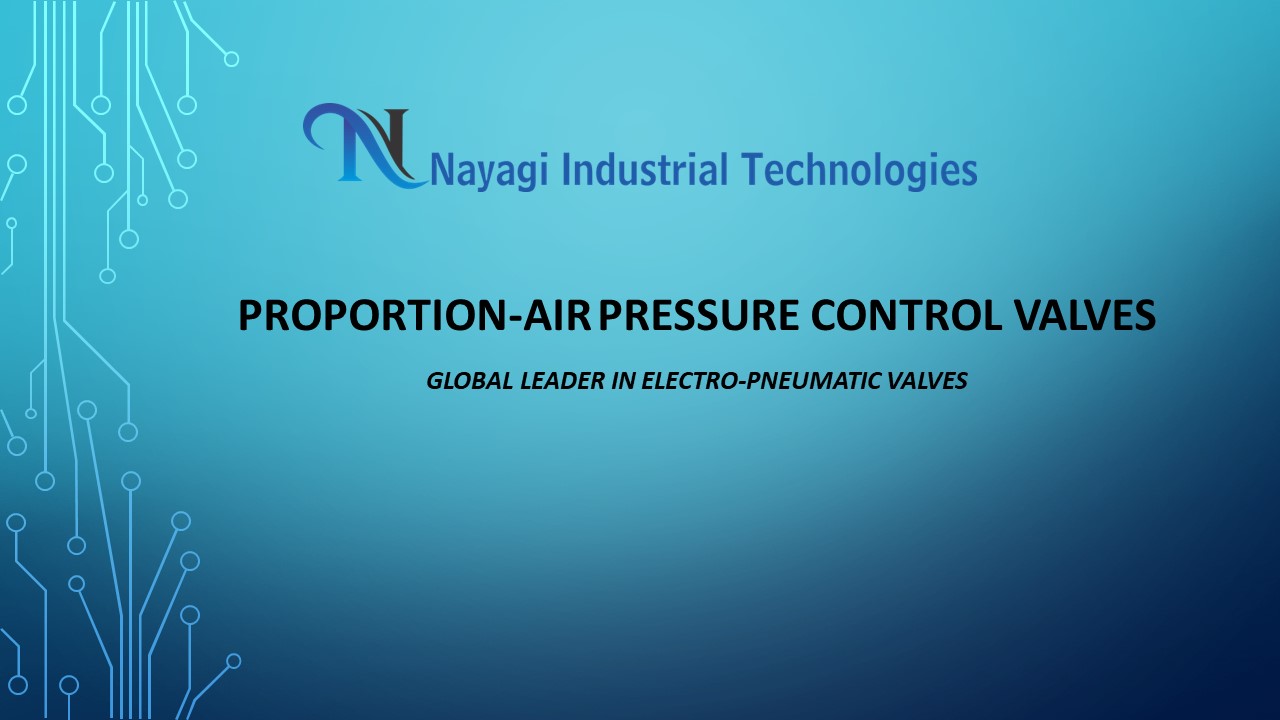Proportional pressure control valves | Nayagi Industrial Technologies - PowerPoint PPT Presentation
Title:
Proportional pressure control valves | Nayagi Industrial Technologies
Description:
Proportion-Air electronically operated valves and regulators provide proportional pressure control of most fluids, inert gases, and some hazardous media. – PowerPoint PPT presentation
Number of Views:3
Title: Proportional pressure control valves | Nayagi Industrial Technologies
1
- Proportion-Air Pressure Control valves
- Global Leader in Electro-Pneumatic valves
2
WHY CHOOSE PROPORTION-AIRAdvanced Pneumatic
Control Technology
- MANY APPLICATIONS, ONE PURPOSE CONTROL
- SUPERIOR SPECS, HAND-BUILT, FACTORY-CALIBRATED
- QUALITY DEVICES MEAN LONGER LIFE CYCLES VALUE
- Many manufacturing processes demand the need for
closed-loop pneumatic pressure control. Control
loops are a chain of events or processes that
always lead back to the point of origin. The
feedback loop allows the system to achieve the
greatest level of accuracy. - Since Proportion-Air is committed to providing
the customer with exceptional products and
service to meet this demand, all Proportion-Air
electro-pneumatic control valves use closed-loop
control technology. - Single loop control valves have a built-in
pressure transducer that constantly monitors
control pressure. When an electronic command
signal is given, the commanded pressure is
compared to the actual pressure and the inlet or
exhaust solenoid valves are actuated until
desired pressure is achieved. Dual loop control
valves expand on the single loop operation by
combining an additional feedback input (in
conjunction with the internal transducer) from
another external sensing device. The ability of
the dual loop to accept electrical feedback from
an external sensor allows precise control of
conditions such as pressure of large volume
systems, vacuum and flow. Proportion-Air carries
a selection - of regulators and sensors to interface with dual
loop mode valves to meet a variety of
applications.
3
DUAL-LOOP TECHNOLOGY
Any Flow or Any media
- Our dual loop technology provides you the
capability to control virtually any media at any
flow rate and any pressure without sacrificing
accuracy and repeatability. - With a properly configured dual loop unit you can
collect feedback from a vacuum, force, flow or
pressure transducer. PID loops no longer need to
be tuned in your controller. Dual loop technology
paired with our unique analog circuit makes
proportional control easy. Ramping pressure,
vacuum, force, or flow up and/or down is simple.
A dual loop control valve can track the ramped
signal from the PLC or computer and achieve the
control setting required.
4
Reason for Dual-Loop Technology?
1. Accuracy 2. Repeatability 3. High Flow
4. Data Acquisition Accuracy The downstream
pressure transducer senses pressure on the work
port of the pressure regulator and allows the
control valve to compensate for inaccuracy
brought about by the mechanical properties of the
regulator. Repeatability High flow capability,
hydraulic or pneumatic media capability, more
simple- to-use control and extremely repeatable
the same conditions with the same command signal
from the same direction can have repeatability as
high as 0.02 of full-scale calibration. High
flow Able to maintain high accuracy even in high
flow applications. Data acquisition Just like
our other electronic pressure regulators, all
dual loop devices have analog output that comes
from the controlling transducer. The dual loop
feedback is provided the downstream transducer.
5
PRESSURE CONTROL Electro-Pneumatic Closed-Loop
Pressure Control Valves
QB1S QB2S The QBS is outfitted with a
stainless steel sensor to handle higher pressure
ranges. Common QBS Applications Instrument
calibration, plastics, and leak and other parts
testing.
MM1 MM2 The MM is a version of the QBX unit
without a housing. Common MM Applications Indust
rial cleaning, stress testing, braking/throttle
control, calibration, pressure and leak testing,
spraying, blending, injection molding, and other
applications where space is at a premium.
6
QB3H Common QB3H Applications Laser cutting,
inflation monitoring, mold ejection, and numerous
tire manufacturing processes.
X1 GX2 Common GX Applications Burst testing,
extrusion, blow molding, and high pressure
instrument calibration.
QPV1 QPV2 Common QPV Applications Welding gas
control, Leak testing, tire manufacturing,
product coating, dispensing, and altitude
simulation.
7
(No Transcript)

